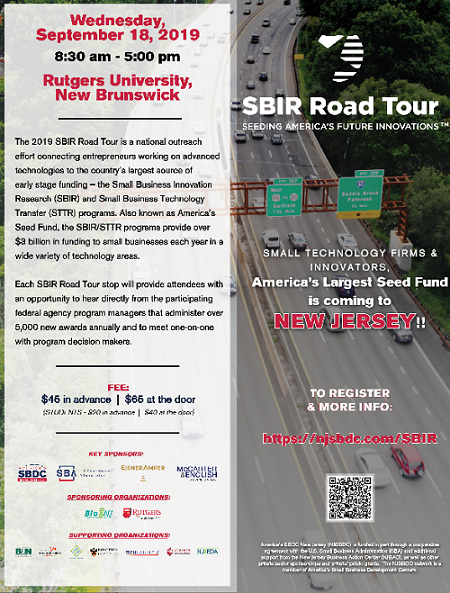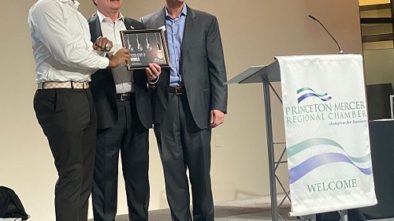The SBIR Road Tour Comes to Rutgers on Sept. 18. We Urge You to Go.
Over the years, NJTechWeekly.com has run into a lot of tech and clean-tech companies that had received R&D funding via the federal government’s Small Business Innovation Research (SBIR) and Small Business Technology Transfer (STTR) grants and contracts. The grants are especially helpful for advanced technologies that are complex and take a long time to research. Basically, they let you do the work on the government’s dime.
“From my perspective, [the grants] are the best source of risk capital to develop a new technology,” said Randy Harmon, technology commercialization consultant for the New Jersey Business Development Center, at Rutgers-Newark, and principal of the Foundations Business Development Group.
“They are the closest thing to the entrepreneur’s holy grail of free money. However, beyond providing an often desperately needed cash infusion, I believe that the real value is that it conserves a small tech company’s pathway to equity financing.”
“From my perspective, [the grants] are the best source of risk capital to develop a new technology.,” Randy Harmon
When VCs or angel investors look to invest in a company, and they see that a startup has been awarded an SBIR grant, it makes it easier for them to say “yes.” They see the award as an external validation of the merits of the small business’s technology, Harmon noted.
Phase 1 awards typically provide $100,000 to $150,000. “Investors love it when a prospective portfolio company wins a Phase l SBIR award,” Harmon continued, “but they love Phase ll even more because it’s a much larger infusion of undiluted capital into the company, and it also means that a company’s technology has been evaluated and vetted a second time.”
SBIR grants have been used to develop artificial intelligence, sensor systems, medical robots, methods of cluster computing and software for editing videos, among many, many other new technologies. The key is to find areas in your research that coincide with projects the government has in mind.
“Beyond providing an often desperately needed cash infusion, I believe that the real value is that it conserves a small tech company’s pathway to equity financing.” Randy Harmon
To that end, NJTechWeekly.com is urging startups to go to the day-long SBIR Road Tour event that will take place at Rutgers’ Cook Student Center, 59 Biel Road, New Brunswick, on Sept. 18. This is the first time the SBIR Road Show will be stopping in New Jersey since its inception, five years ago. It’s an opportunity to learn about the program directly from decision-makers.
According to Harmon, the Small Business Administration invites the 12 SBIR agencies to participate, “and a majority do, including the five largest R&D agencies that also participate in STTR and are responsible for most of the SBIR awards. The representatives deliver a morning overview program and are available for concurrent 15-minute one-on-one conversations with attendees. There will be a networking lunch followed by an afternoon program.”
The most important aspect of this event is the one-on-one conversations with program managers and representatives, which will take place in the morning. If you are developing a technology and you are not sure if it fits into an agency’s wheelhouse, here is a chance to discuss it with an SBIR representative and figure out where you should direct your efforts.
There is a difference between the contracts and the grants. In the case of the contracts, the topics are very specific and the government knows just what it is looking for. In the case of the grants, the agencies issue broad categories, and want to see creativity and innovation as small businesses propose more specific topics that fit in with the agencies’ interests and missions.
The opportunities with certain agencies can be surprising. “We think of the Department of Defense very narrowly, but the Army, for example, has the second-largest breast cancer program in the country because they are concerned about the needs of female [soldiers],” Harmon noted.
Since each agency does things a little differently, applying for the grants can be tricky, but the conference will the cover common mistakes that applicants make. One thing to remember is that the agencies expect their applicants to follow directions. Like Burger King, “the agencies expect you to serve the proposals to them their way,” Harmon said.
Each agency also has different names for the parts of the proposals, but there is generally a research plan and a cost proposal or budget. An afternoon session with Anthony Faugno, partner-in-charge of the Federal Government Contracting Group at the advisory/accounting firm EisnerAmper (Iselin), will cover what entrepreneurs need to know about cost proposals. And Daniel Kelly, partner in the government contracts group at the law firm McCarter & English will be running a session on developing an intellectual-property strategy in connection with these proposals.
The U.S. Patent and Trademark Office will be participating in the program, as well. “They’ve developed an alliance with the SPIR program because intellectual property protection is a particular concern of entrepreneurs,” said Harmon. “As to whether submitting a proposal is the equivalent of a public disclosure, one of the few things all the agencies agree on is that there should be no proprietary information in your summary or abstract because if your proposal is funded, your abstract will be published and distributed among senators and congresspeople.” Entrepreneurs can mark information that shouldn’t be disclosed, but it must be done in the specific way your targeted agency tells you to.
During the afternoon, there will also be a panel of representatives from NJIT, Princeton and Rutgers who will discuss collaboration with New Jersey’s research institutions. In another afternoon session, David Sorin, chair of the Venture Capital & Emerging Growth Companies Group at McCarter & English (East Brunswick and New York), will give a talk on “Financing Strategies for Commercialization.”
To sum up, a lot of information will be thrown at you at this Road Tour event, but it will be information you can directly use to fund your business. So what have you got to lose?




